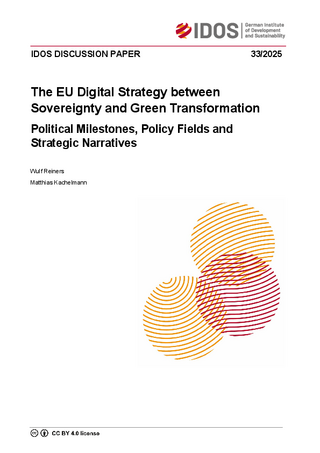The EU digital strategy between sovereignty and green transformation: political milestones, policy fields and strategic narratives
Reiners, Wulf / Matthias KachelmannDiscussion Paper (33/2025)
Bonn: German Institute of Development and Sustainability (IDOS)
ISBN: 978-3-96021-278-2
DOI: https://doi.org/10.23661/idp33.2025
Accelerated by the COVID-19 pandemic and technological developments such as artificial intelligence, digital transformations affect almost all areas of social, economic, and environmental life. Emerging as a tool for addressing challenges – but also as a source of new problems or as an amplifier of existing challenges – digital transformation has increasingly become the focus of initiatives at the European Union (EU) level. Since 2015, the EU has developed a comprehensive digital agenda spanning various policy domains, ranging from bolstering the single market to addressing foreign and security policy concerns. This paper examines the evolving landscape of digitalisation-related EU policies through the lens of strategy documents and policy guidelines, with particular emphasis on developments between 2020 and 2025. It explores the EU’s overarching approach towards digitalisation – its conceptualisation, objectives, and self-defined role in shaping the digital revolution. The analysis reveals that the EU addresses digitalisation through a multitude of policy-specific strategies and guidelines, characterised by four predominant strategic narratives: A geopolitical (“digital sovereignty”), an environmental (“twin transitions”), a socio-political (“fundamental rights”), and an economic (“growth and competitiveness”) narrative.



